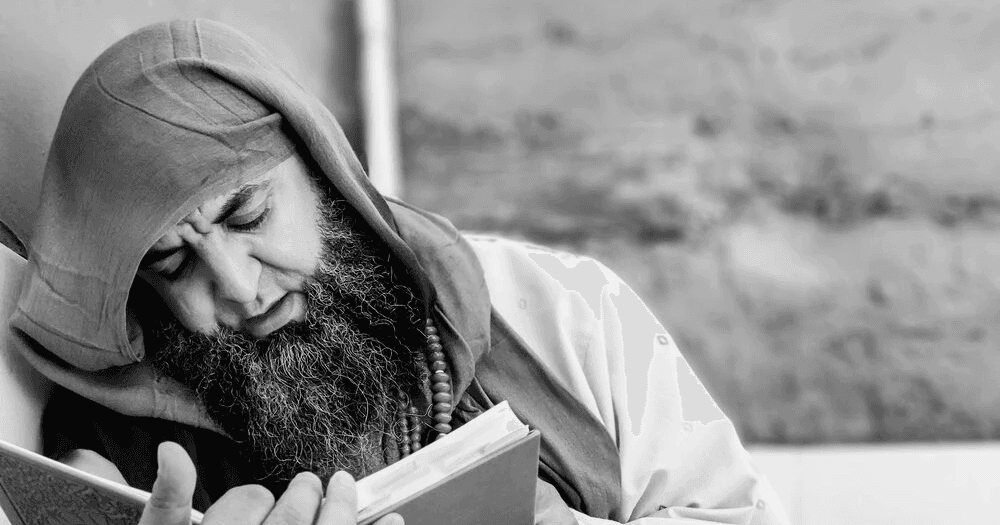Book
AN EXCERPT FROM
THE
FOUNDATIONS
OF THE
KARKARIYA
ORDER
The Foundations outlines the spiritual principles and practices of the Karkariya Sufi Order and their basis in the Quranand the Sunnah. It covers key concepts such as the Pact (al-ʿahd), the Sacred Dance (al-ḥaḍra), and the invocation of the Singular Name (al-ism al-mufrad), guiding disciples on their path to divine knowledge and spiritual growth.
By Shaykh Mohamed Faouzi al-Karkari
Translated from the Arabic
by Dr. Yousef Casewit, Khalid Williams,
and Jamil Zaghdoudi
Originally published by Les 7 Lectures
In the Arabic language
In the Terminology of the Karkariya Order
The patched cloak is an expression of self-concealment in the garb of the Essence’s beauty. This divine beauty, which remains non-manifest in the differentiation of the Names, discloses itself in the colors of the Higher Bow. (Translator’s note: In the Shaykh’s teachings, the higher bow (al-qaws al-ʿulwī) contrasts with the lower bow (al-qaws al-suflī) of the letter Bāʾ. Whereas the lower bow is visible and represents the revealed Law, the higher bow is invisible and represents esoteric realities. Together, the two dimensions of religion form a complete circle whose center is the dot (nuqṭa). This central dot is the secret of the Qurʾān with which ʿAlī ibn Abī Ṭālib identifies himself in the statement, “I am the secret of the dot.” In the definition of the patched cloak above, the colors of the “upper bow” also suggest the rainbow.)
The patched cloak is a declaration of the soul’s allegiance to the Spirit for the purpose of entering upon and ascending through its levels.
In the Holy Qurʾān
God says: Thus he lured them on through deception. And when they tasted of the tree, their nakedness was exposed to them, and they began to sew together the leaves of the Garden to cover themselves. And their Lord called out to them, “Did I not forbid you from that tree, and tell you that Satan is a manifest enemy unto you?”(Q Aʿrāf 7:22).
God says: O Children of Adam! We have indeed sent down upon you raiment to cover your nakedness, and rich adorn- ment. But the raiment of reverence, that is better. This is among the signs of God, that haply they may remember. (Q Aʿrāf 7:26).
God says: O Children of Adam! Let not Satan tempt you, as he caused your parents to go forth from the Garden, stripping them of their raiment to show them their nakedness. Surely he sees you—he and his tribe—whence you see them not. We have indeed made the satans the friends of those who do not believe. (Q Aʿrāf 7:27).
God says: God sets forth a parable: a town secure and at peace, its provision coming unto it abundantly from every side. Yet, it was ungrateful for the blessings of God; so God let it taste the garment of hunger and fear for that which they had wrought. (Q Naḥl 16:112).
God says: Truly God will cause those who believe and per- form righteous deeds to enter Gardens with rivers running below, adorned therein with bracelets of gold and pearl, and therein their clothes will be of silk. (Q Ḥajj 22:23).
God says: And He it is Who made the night a garment for you, and made sleep repose, and made day a resurrection.(Q Furqān 25:47).
God says: [Did We not] make the night a garment? (Q Nabaʾ 78:10).
In the Noble Hadith
Abū Burda said, “‘ʿĀʾisha brought out to us a patched woolen garment, and said: “The spirit of God’s Messenger ﷺ was taken away while he was wearing this.” Another narration states that Abū Burda said, “Aisha brought out to us a thick waist-wrapper like the ones made by the Yemenites, and also a garment of the type called mulabbada.” (Bukhārī, Ṣaḥīḥ #2894).
Ibn Kaysān narrated that Abū Umāma related that God’s Messenger ﷺ said, “Badhādha is part of faith”, three times. Abū Umāma’s son ʿAbd Allāh asked him, “What is badhādha?” He replied, “To dress modestly.”(Aḥmad, Zuhd, #29).
Sahl b, Muʿādh related on the authority of his father that God’s Messenger ﷺ said, “When someone holds back his anger though he could take vengeance if he wanted to, God Almighty will summon him before all of mankind and let him choose whichever maiden of Paradise he desires. And when someone refrains from wearing fancy clothes, though he can afford them, out of humility before God, God Almighty will summon him before all of mankind and let him choose whichever cloak of faith he desires.” (Aḥmad,Musnad#15312).
Umm Khālid bint Khālid related that the Prophet ﷺ was given some clothes including a black dress. He said, “To whom shall we give this dress to wear?” The people kept silent, where- upon he said, “Fetch Umm Khālid.” They fetched her, and the Prophet ﷺ put the dress on her and said, “May you live so long that your dress will wear out, and you will mend it many times.” The dress was pattered with markings of green, yellow and red, which the Prophet ﷺ showed to Umm Khālid, saying, “This is sanā”, which means “beauty” in the Abyssinian language. (Bukhārī, Ṣaḥīḥ #5425, #5403; Ḥākim, Mustadrak #7471, #2304).
It was narrated from Muʿādh b. Jabal that God’s Messenger ﷺ said, “Shall I not tell you about the kings of Paradise?” I said, “Indeed, do.” He said, “A weak and oppressed man who wears tattered clothes and is not paid any heed. If he swears an oath by God, God fulfills it.” (Ibn Mājah, Sunan #4113).
The Basis of the Muraqqaʿa
It is the tradition of the righteous, the hallmark of the pious, and the clothing of the gnostics. It is the distinctive sign of the sincere disciple who is in his search for the Real, extinguished in the love of his Shaykh, and divested of his own will.
The patched robe is the symbol of deferential resignation, entrustment, and putting oneself in the hands of the perfected gnostic Shaykh. In this way, the Shaykh will allow the disciple to see the flaws of his soul and its levels, so that it is purified and elevated from the nafs ammāra (the evil-enjoining soul), to the nafs lawwāma (lamenting soul), to the nafs muṭmaʾinna (the soul at peace), to the nafs rāḍiya (the content soul), to the nafs marḍiyya (the contenting soul), and finally to the nafs rājiʿa ilā rabbihā (the soul returned unto its Lord).
It has been said that the one who never sees a successful person will never succeed, and the one who has no Shaykh has Iblīs for his shaykh. What do you think about the one who learns a craft without a teacher?
In general, a tree that grows by itself does not give edible fruits; and even if it does, those fruits never reach the same quality as those of a tended orchard.
Abū Hurayra narrated that the Prophet ﷺ said, “Faith has seventy-some (or sixty-some) branches, the foremost of which is to say, ‘There is no god but God’, and the least of which is to remove harmful objects from the road. Modesty is a branch of faith.” (Muslim,Ṣaḥīḥ#54).
So the least branch of faith is removing harmful objects from the road to God, and nothing is more harmful than your soul. It is your greatest enemy, so strive to remove its harm, and know that there is nothing harder for the soul than the loss of people’s esteem. This is reason the muraqqaʿa is one of the founding principles of the disciple’s spiritual education in our blessed Order.
God says: O thou who art covered, arise and warn! Thy Lord magnify! Thy garments purify! (Q Muddaththir, 74:1-4).
God has a garment in which he dresses his servant when his love is genuine. This clothing helps the disciple to detach from the garb of the herebelow, and to suffice with a muraqqaʿa or a simple robe which he wears here and there without worrying about other people. This disciple no longer sees other than his Lord, and prefers the eternal to the ephemeral.
Abū Hurayra narrated that God’s Messenger ﷺ said, “O people! God is Pure and accepts only that which is pure. God has commanded the believers as He has commanded His messengers by saying: O messengers! Eat of the good things and work righteousness. (Q Muʾminūn 23:51).
And He says, O you who believe! Eat of the good things We have provided you. (Q Baqara 2:172). Then he made mention of a man who travels for a long period of time, dishev- eled and covered with dust. He lifts his hand towards the sky and cries, “My Lord! My Lord!” But his food is unlawful, his drink unlawful, his clothes unlawful, and his nourishment unlawful. How, then can his prayer be answered?” (Muslim,Ṣaḥīḥ#1692).
How could your prayers be answered while your clothes are unlawful? The evil of your deeds is manifested in your outward appearance. The angels never enter a house where a dog lives, so how could the Lights of the Real flow through you, while your body is clothed in the unlawful? Remove all your clothes, and put on the clothing of piety!
God says: And He it is Who made the night a garment for you, and made sleep repose, and made day a resurrection. (Q Furqān 25:47).
The dark night of your soul is the primordial garment of all, which God made as a veil between His creation and the secrets of pre-eternity. He who is predestined for the divine love will be guided to a lordly Shaykh who knows God, and who will res- urrect the day of his spirit, thereby covering the sign of the night with the sign of the day. Moreover, the sign of the day is sight-giving (Q Isrāʾ 17:11), and so he will see the secrets that God has folded within him. When he gains strength and mastery, his inner being will imprint over his outer being; for the outer is only the reflection of the inner, and a man is clothed in nothing other than his inmost secret.
God’s Messenger ﷺ said, “Keep whatever secret you wish; for by God, whenever any man or woman keeps a secret, God clothes them in its robe. If it is good, then it will be good; and if it is bad, then it will be bad. Even if one you accomplished a good deed behind seventy veils, God would make it visible so that people spoke well of him. And even if one of you hid some- thing evil behind seventy veils, God would make it visible so that people spoke ill of him.” (Abū Nuʿaym, Ḥilya #6355).


